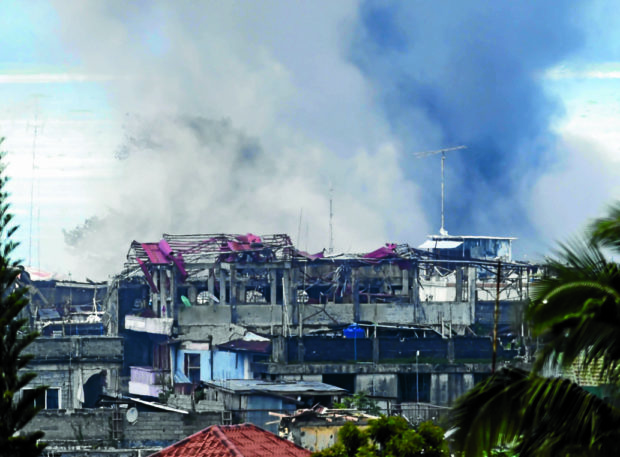
RUINED CITY Airstrikes and artillery bombardment have left much of Marawi City in ruins. —AFP
The government will release at least P15 billion to rehabilitate Marawi City in the next two years, Budget Secretary Benjamin Diokno said on Friday.
In a statement, Diokno said the Department of Budget and Management (DBM) had allotted about P5 billion this year, P10 billion for next year and a yet to be determined amount for 2019.
Diokno noted that President Duterte earlier pledged P20 billion for the rehabilitation of the city where government forces had been fighting Islamic State supporters since late May.
Diokno said the budget allocations would form part of the Department of Public Works and Highways (DPWH)-led comprehensive master plan for Marawi reconstruction and rehabilitation.
“The budgets and funding sources for 2017 and 2018 have been identified prior to the creation of the DPWH master plan in order to quickly respond to the needs of ongoing efforts and to accommodate the rehabilitation plan as soon as it is set up. The budget allocation for 2019 will be estimated based on the remaining needs of the plan,” Diokno said.
“The initial fund of P5 billion for 2017 will be sourced from the 2016 and 2017 NDRRM (National Disaster Risk Reduction and Management Council) fund with a combined remaining balance of around P7.4 billion, and the 2017 contingent fund with a balance of almost P3.35 billion, both as of July 2017,” Diokno said.
“Funds could also be sourced from the respective budgets of different agencies such as the Department of Social Welfare and Development (DSWD), the DPWH, the Armed Forces of the Philippines Engineering Brigade, and foreign donors. China has already donated P15 million for Marawi’s rehabilitation to boost the resources of the Department of Health and the DSWD,” Diokno said.
Under the proposed P3.767-trillion 2018 national budget, Diokno said P310 million had also been allocated for 12 infrastructure projects under the Autonomous Region in Muslim Mindanao’s regional DPWH.
Also, for the NDRRM fund for 2018, P25.5 billion has been allocated, of which P10 billion had been allotted for the Marawi recovery and rehabilitation program, according to Diokno.
As a whole, “the ongoing conflict in Marawi City will not significantly affect the performance of the Philippine economy, nor will it warrant the creation of a supplemental budget to rehabilitate the area,” the budget chief said.
Emergency loans
Meanwhile, the state-run Government Service Insurance System (GSIS) will also offer emergency loans to members and pensioners living or working in Marawi City from July 5 until Aug. 3.
The GSIS has allocated P282 million for 11,128 members as well as 592 old-age pensioners.
“Since the clashes between military forces and the terrorist group have been preventing the city council to convene and issue the required resolution declaring Marawi as a calamity area, the GSIS has decided to forego the said requirement and immediately offer the loan to help its members and pensioners in the area,” GSIS officer in charge Nora Malubay-Saludares said in a statement.
Members with no existing emergency loans could borrow P20,000, while those with emergency loan balances could apply for a P40,000 loan, from which the GSIS said their outstanding balance would be deducted.
The loanable amount for pensioners is P20,000.
“Old-age pensioners may avail of the loan by personally applying at any GSIS branch office. Pensioners who have become active members anew after reentering government service may apply for the loan only once,” the GSIS said.
The loan shall have a 6-percent interest per annum computed in advance, payable in 36 monthly installments.
It will be also covered by a loan redemption insurance, under which the immediate family does not have to pay the remaining balance when the member dies, as the loan shall be deemed fully paid as long as the loan repayment is up to date, according to the GSIS.
The loan proceeds will be electronically credited to the borrower’s GSIS electronic card (eCard) or unified multipurpose ID card.